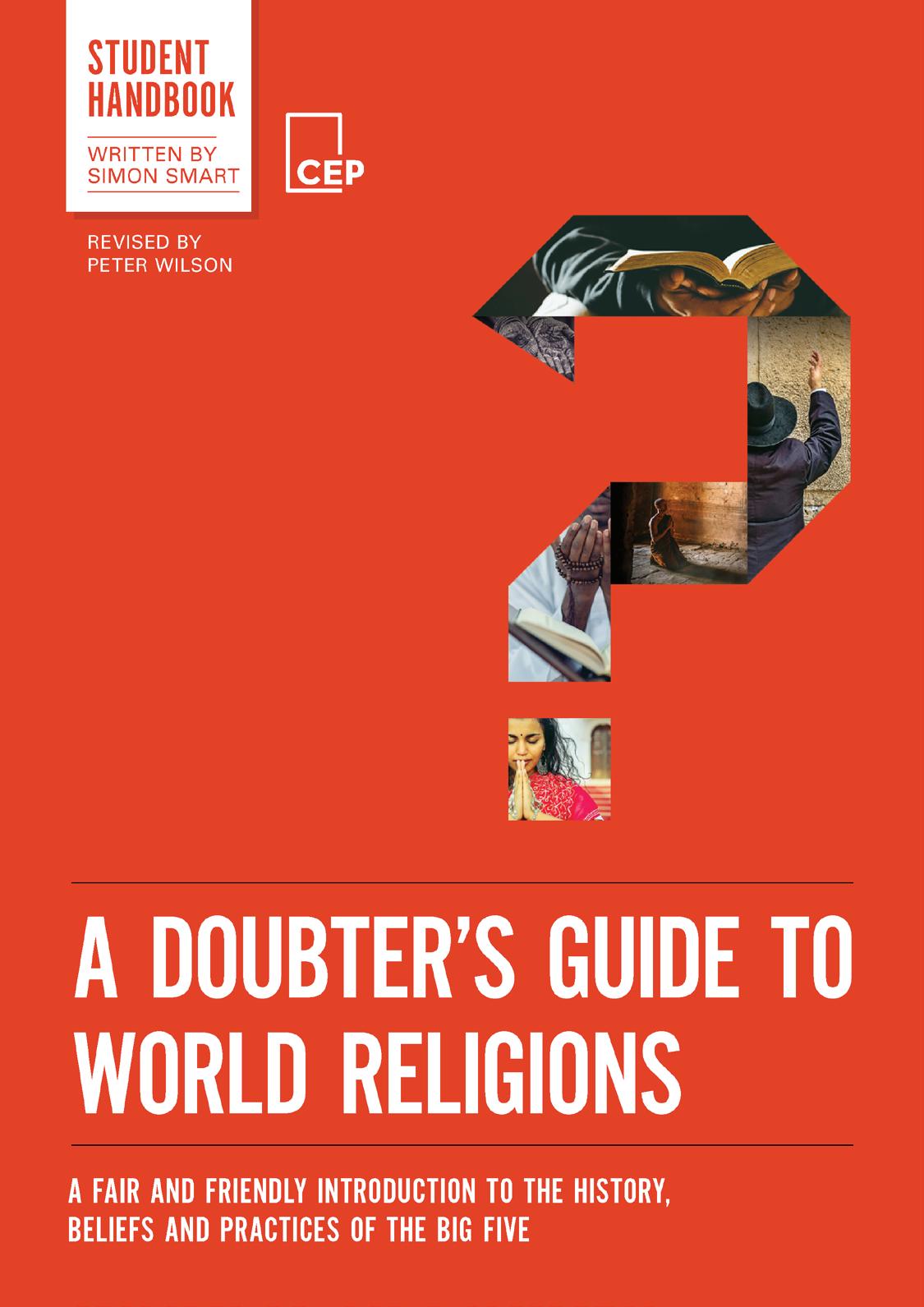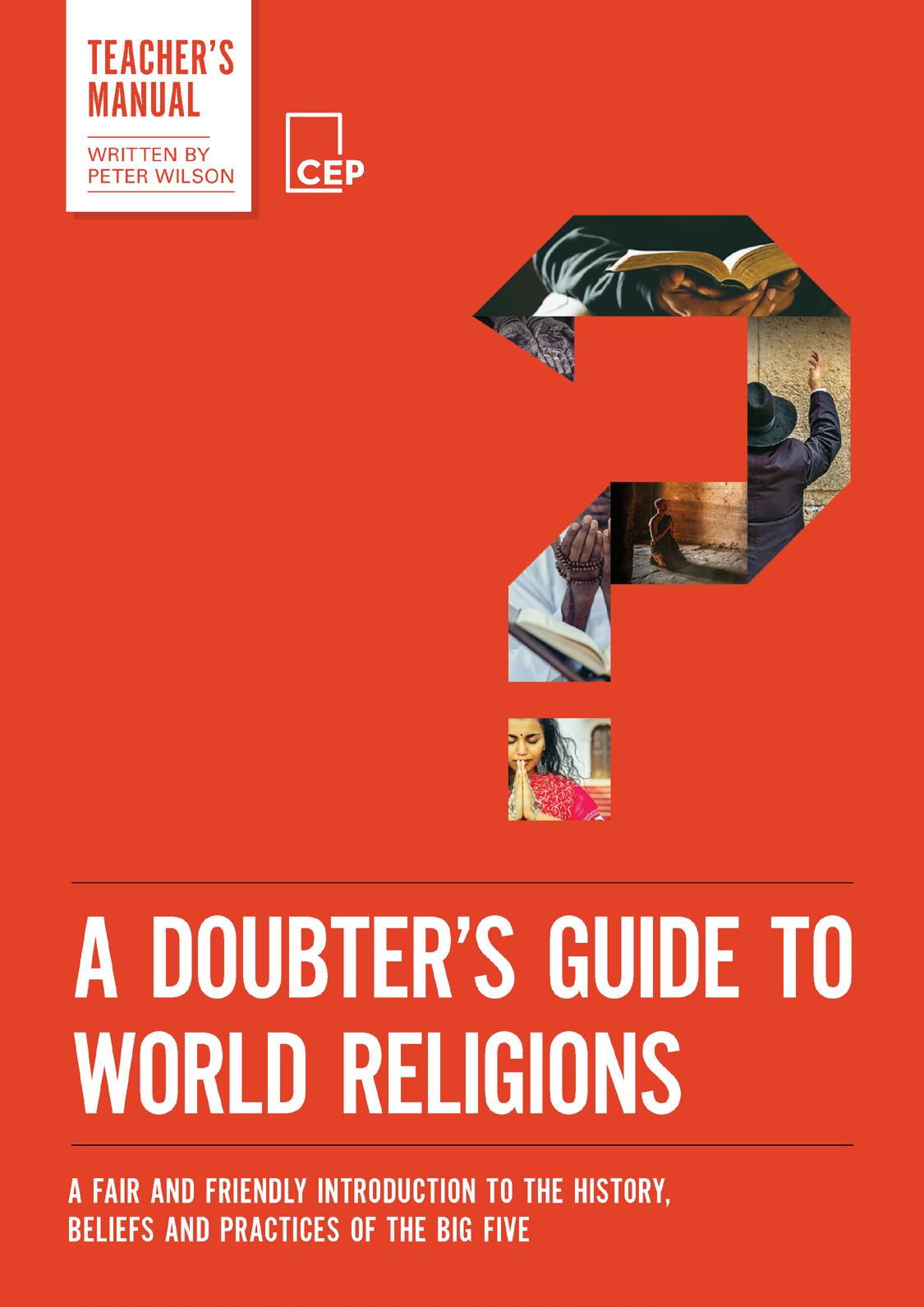A DOUBTER’S GUIDE TO WORLD RELIGIONS
A FAIR AND FRIENDLY INTRODUCTION TO THE HISTORY, BELIEFS AND PRACTICES OF THE BIG FIVE


A FAIR AND FRIENDLY INTRODUCTION TO THE HISTORY, BELIEFS AND PRACTICES OF THE BIG FIVE

Lesson 1 A word or two to spectators
• The nature and purpose of religion
• The value of theology and history in understanding the world
• The significance of the world’s major religions and the relevance of studying them.
• Develop a working definition of religion
• Reflect on the nature and purpose of religion in society and in their own lives
• Begin to explore their own beliefs and responses to the world religions being studied.
Lesson 2 Hinduism, the way of release
• Hinduism as an ancient, diverse and complex belief system without a founder
• Various Hindu writings emphasise differing understandings of the meaning of life
• The Hindu understanding of the cyclical view of life and history, including entrapment, karma and moksha
• An explanation of the caste system and its social implications.
Students will know about:
The origins, history, beliefs and practices of Hinduism
• The importance of understanding Hinduism in making sense of our world.
Students will be able to:
• Explain Hinduism’s approach to making meaning in our world
• Assess the various truth claims made by Hinduism
• Discuss Hinduism with a degree of knowledge and expertise
Explore personal beliefs and responses to Hinduism.
Students will have the opportunity to:
• Critically examine contemporary examples of the lived expressions of Hinduism
• Demonstrate an understanding of the major beliefs and practices of Hinduism
• Analyse different approaches to framing and answering the big questions of life
• Demonstrate oral and written communication skills when approaching matters of faith and belief
• Develop skills in presenting arguments and adopting the position of people with different points of view to themselves.
Lesson 3 Buddhism, the way of enlightenment
• An introduction to the origins, history, beliefs and practices of Buddhism
• Buddha’s critique of Hinduism and resultant variations of belief and practice
• The Four Noble Truths and Eightfold Path are a sequential and integrated expression of the Buddhist way of life
• An explanation of the various forms of Buddhism.
Students will know about:
• The origins, history, beliefs and practices of Buddhism
• The variations between Buddhism and Hinduism
• The importance of understanding Buddhism in making sense of our world.
Students will be able to:
• Explain the approach of Buddhism to making meaning in our world
• Assess the various truth claims made by Buddhism
• Discuss Buddhism with a degree of knowledge and expertise
• Explore personal beliefs and responses to Buddhism.
Students will have the opportunity to:
Critically examine contemporary examples of the lived expressions of Buddhism
Demonstrate an understanding of the major beliefs and practices of Buddhism
Analyse different approaches to framing and answering the big questions of life
Demonstrate oral and written communication skills when approaching matters of faith and belief
• Develop skills in presenting arguments and adopting the position of people with different points of view to themselves.
Lesson 4 Judaism, the way of the Torah
• An introduction to the origins, history, beliefs and practices of Judaism
• The importance of the Torah as central to Jewish beliefs, practices and lifestyle
• The significance of the Temple, forgiveness and Messianic hope
• An explanation of the various forms of Judaism.
Students will know about:
• The origins, history, beliefs and practices of Judaism
• The various forms of Judaism and how they have developed
• The importance of understanding Judaism in making sense of our world.
Students will be able to:
• Explain the approach of Judaism to making meaning in our world
• Assess the various truth claims made by Judaism
• Discuss Judaism with a degree of knowledge and expertise
• Explore personal beliefs and responses to Judaism.
Students will have the opportunity to:
• Critically examine contemporary examples of the lived expressions of Judaism
• Demonstrate an understanding of the major beliefs and practices of Judaism
• Analyse different approaches to framing and answering the big questions of life
• Demonstrate oral and written communication skills when approaching matters of faith Seeand belief
• Develop skills in presenting arguments and adopting the position of people with different points of view to themselves.
Lesson 5 Christianity, the way of the Christ
• An introduction to the origins, history, beliefs and practices of Christianity
• The importance of the person and teachings of Jesus Christ to Christians
• The development of the New Testament as a record of the distinctive teachings of Christianity
• An explanation of the various forms of Christianity.
Students will know about:
• The origins, history, beliefs and practices of Christianity
• The various forms of Christianity and how they have developed
• The importance of understanding Christianity in making sense of our world.
Students will be able to:
Explain the approach of Christianity to making meaning in our world
Assess the various truth claims made by Christianity
• Discuss Christianity with a degree of knowledge and expertise
• Explore personal beliefs and responses to Christianity.
Students will have the opportunity to:
• Critically examine contemporary examples of the lived expressions of Christianity
• Demonstrate an understanding of the major beliefs and practices of Christianity
Analyse different approaches to framing and answering the big questions of life
Demonstrate oral and written communication skills when approaching matters of faith and belief
Develop skills in presenting arguments and adopting the position of people with different points of view to themselves.
Lesson 6 Islam, the way of submission
• An introduction to the origins, history, beliefs and practices of Islam
• The life of Muhammad and his role as the founder of Islam
• The centrality of the Five Pillars of Islam
• An explanation of the various forms of Islam.
Students will know about:
• The origins, history, beliefs and practices of Islam
• The various forms of Islam and how they have developed
• The importance of understanding Islam in making sense of our world.
Students will be able to:
• Explain the approach of Islam to making meaning in our world
• Assess the various truth claims made by Islam
• Discuss Islam with a degree of knowledge and expertise
• Explore personal beliefs and responses to Islam.
Students will have the opportunity to:
• Critically examine contemporary examples of the lived expressions of Islam
• Demonstrate an understanding of the major beliefs and practices of Islam
• Analyse different approaches to framing and answering the big questions of life
• Demonstrate oral and written communication skills in approaching matters of faith and belief
• Develop skills in presenting arguments and adopting the position of people with different points of view to themselves.
Lesson 7
Letting the religions have their say
• A comparison of the differing beliefs of the world religions with particular reference to their varied understandings of the person and work of Jesus Christ
• An introduction to the concept of pluralism and an explanation of some of its key arguments.
Students will know about:
• The complexity of religious beliefs and truth claims
• The basis of the Christian faith and its claims about the uniqueness of Jesus Christ.
Students will be able to:
Assess the various truth claims made by the world religions
• Bring a biblical understanding to world religions in order to formulate a Christian response, even if it is not a personal one
Understand the basis of the Christian approach to making sense of life and God’s purpose for humanity and all creation.
Students will have the opportunity to:
Analyse different approaches to framing and answering the big questions of life
• Demonstrate oral and written communication skills in approaching matters of faith and belief
• Develop skills in presenting arguments and adopting the position of people with different points of view to themselves
Consider the implications of the unique claims of the Christian faith upon the choices they make in their own lives
• Be challenged to consider the uniqueness of Jesus Christ and their personal response to him.


